Emigration to the US, How bugs hitch-hike across the galaxy, Finding out about the world from television news - Reading Answers
24 min read
Updated On
-
Copy link
Look into the IELTS Reading Practice Test 28 with Answers and it has topic Emigration to the US, How bugs hitch-hike across the galaxy, Finding out about the world from television news. Do upgrade your reading skills which can be useful for IELTS test.
Table of Contents

Limited-Time Offer : Access a FREE 10-Day IELTS Study Plan!
In the Academic Reading practice test, “Emigration to the US, How bugs hitch-hike across the galaxy And Finding out about the world from television news” there are 40 questions of various question types. Each of these question types are asked in IELTS Academic Reading. So, the passages given in this practice set will help you enhance your reading and understanding capabilities.
We at IELTSMaterial.com would urge every IELTS aspirant to time this test as in the real exam and find the answers without looking at the key. If you have scored 40/40, then we wish you all the best. If you haven’t, then we would earnestly advise you to take one of our IELTS reading practice tests.
Here are question types in this reading test
- IELTS Reading Multiple Choice Questions
- IELTS Reading Sentence Completion
- IELTS Reading Matching Sentence Endings
- IELTS Reading Matching Features
- Diagram Completion IELTS Reading
- IELTS Reading Summary Completion
- True/False/Not Given IELTS Reading
Reading Passage 1
Emigration to the US
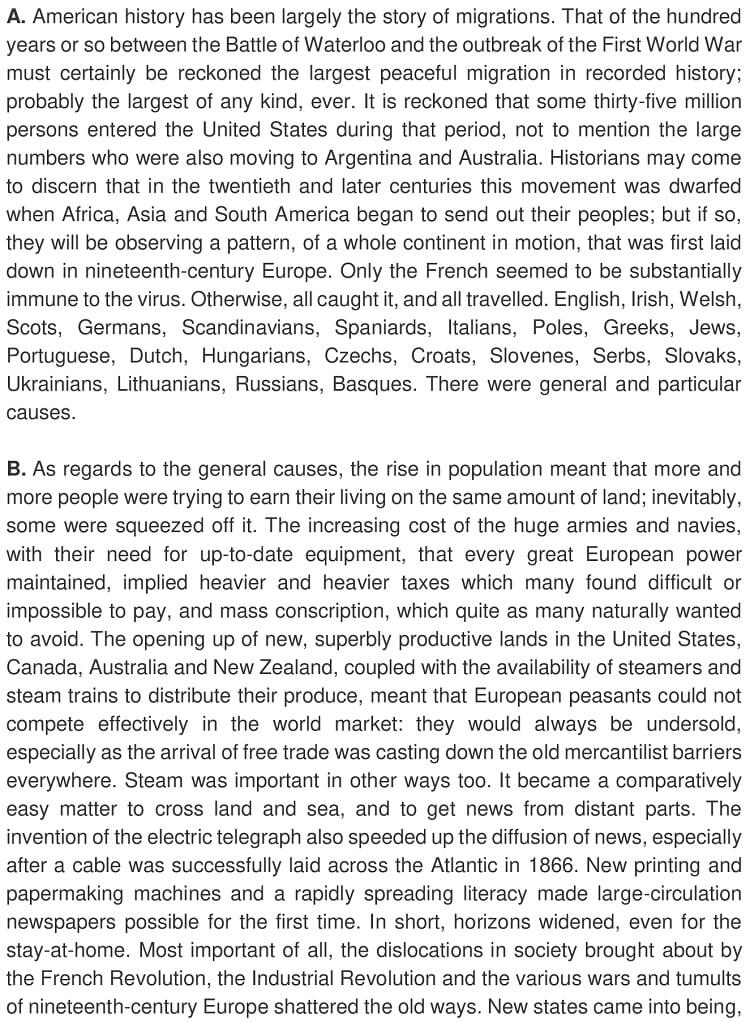
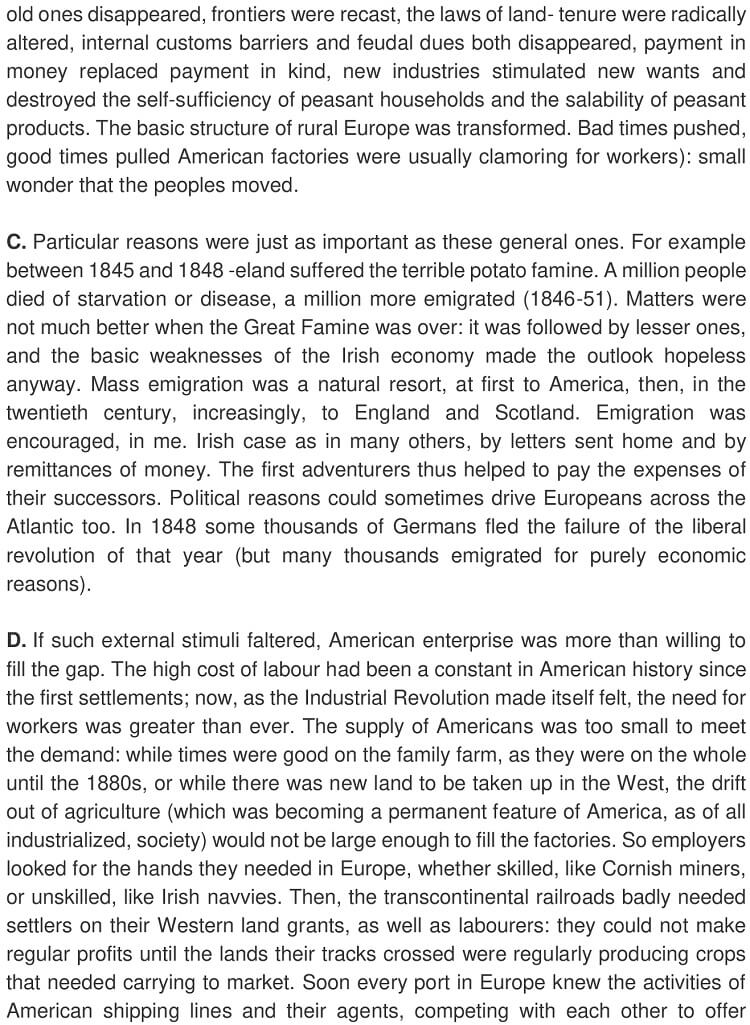

[do_widget id=custom_html-23]
Question 1
1 Which of the following does the writer state in the first paragraph?
A The extent of emigration in the nineteenth century is unlikely to be repeated.
B Doubts may he cast on how much emigration there really was in the nineteenth century.
C It is possible that emigration from Europe may be exceeded by emigration from outside Europe
D Emigration can prove to be a better experience tor some nationalities than for others.
Questions 2-9
Complete the sentences below with words taken from Reading Passage 1.
Use NO MORE THAN THREE WORDS for each
Write the answer, your answers in blank spaces next to 2-9 on your answer sheet.
General causes of emigration to the US
Population increases made it impossible for some to live in agriculture. In Europe, countries kept 2………………………… that were both big, and this resulted in increases in 3……………………………… and in 4……………………………….., which a lot of people wanted to escape. It became impossible for 5………………………………….. in Europe to earn a living because of developments in other countries and the introduction of 6…………………………………… People knew more about the world beyond their own countries because there was greater 7……………………. 8…………………………….. had been formed because of major historical events. The creation of 9……………………………………………………………. caused changes in demand.
Questions 10-13
Complete each sentence with the correct ending A-H from the box below.
Write the correct letter A-H in boxes 10-13 on your answer sheet.
10 The end of the potato famine in Ireland
11 People who had emigrated front Ireland
12 Movement off the land in the US
13 The arrival of railroad companies in the West of the US-made
A people reluctant to move elsewhere.
B resulted in a need for more agricultural workers.
C provided evidence of the advantages of emigration.
D created a false impression of the advantages of moving elsewhere.
E did little to improve the position of much of the population.
F took a long time to have any real effect.
G failed to satisfy employment requirements.
H created a surplus of people, who had emigrated.
Reading Passage 2
How bugs hitch-hike across the galaxy
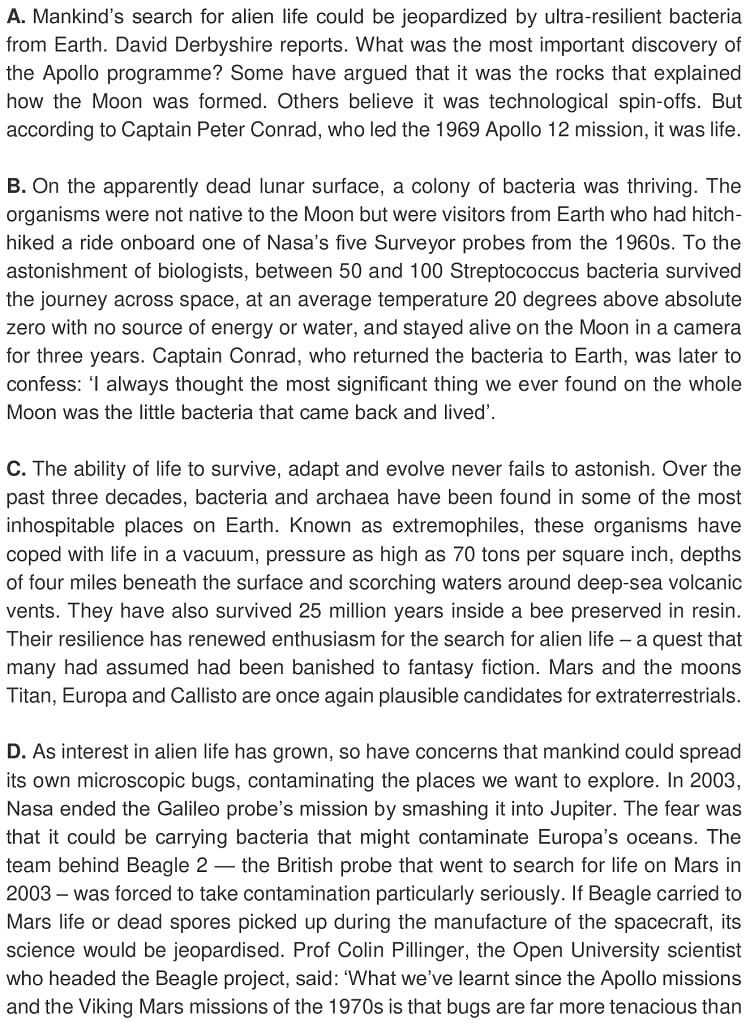
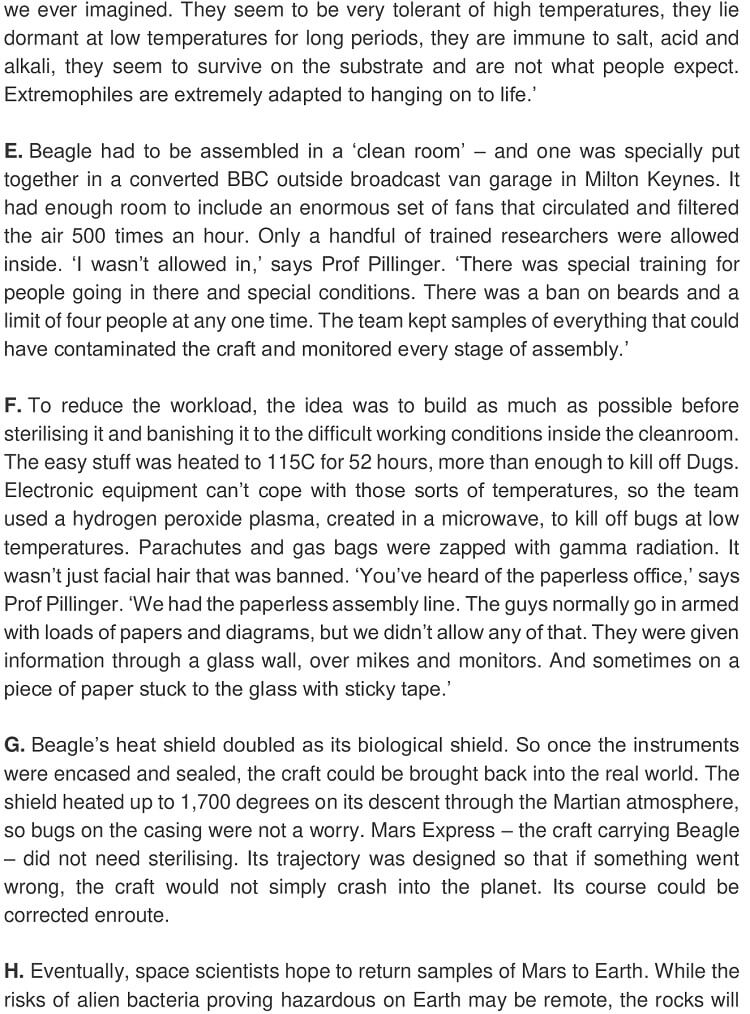

Questions 14-20
Look at the statements (Questions 14—20) arid the list of spacecraft below.
Match each statement with the spacecraft it applies to.
Write the correct letter A-E in boxes 14-20 on your answer sheet.
14 provided transport from Earth tor bacteria
15 led to the realisation of how tenacious bacteria are
16 was created so that there could be no bacteria on the outer structure
17 was capable of changing direction in the event of a problem
18 brought material which was kept in more than one kind of container
19 required action because of the possibility of the introduction of harmful bacteria
20 resulted in disagreement as to the relative value of what was found
List of Spacecraft
A Apollo craft
B Surveyor probe
C Galileo probe
D Beagle 2
E Mars Express
Questions 21-26
Label the diagram below.
Choose NO MORE THAN THREE WORDS from the reading passage for each answer.
Write your answers in boxes 21 —26 on your answer sheet.
The Assembly of Beagle 2
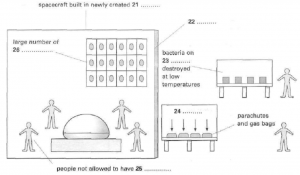
21
22
23
24
25
26
Reading Passage 3
Finding out about the world from television news
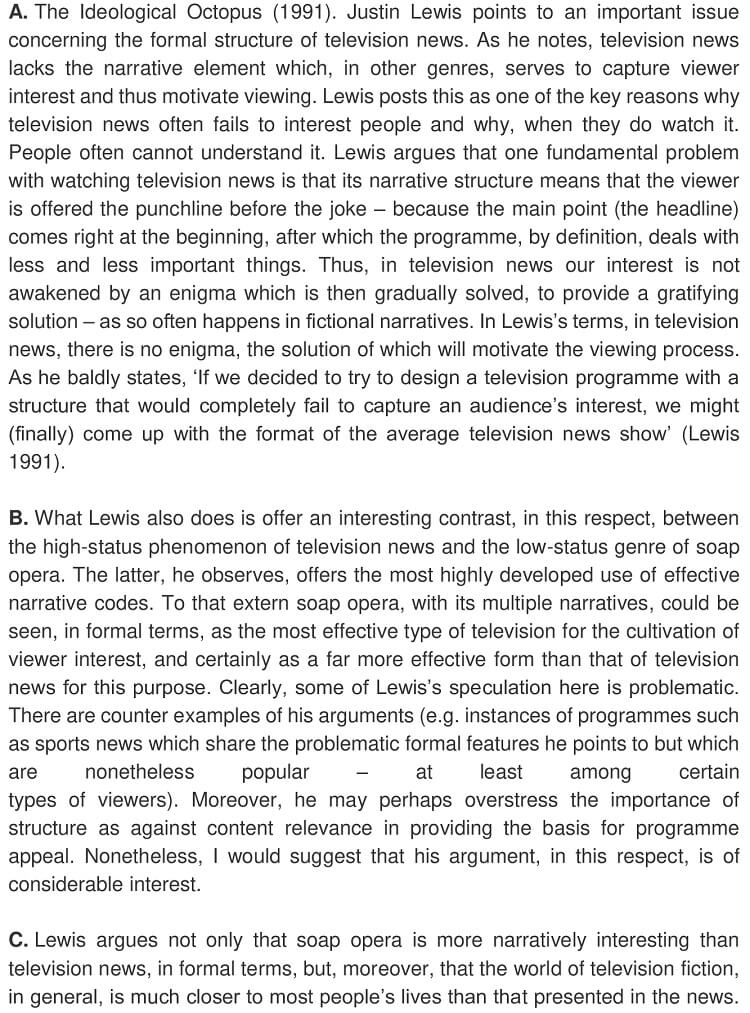
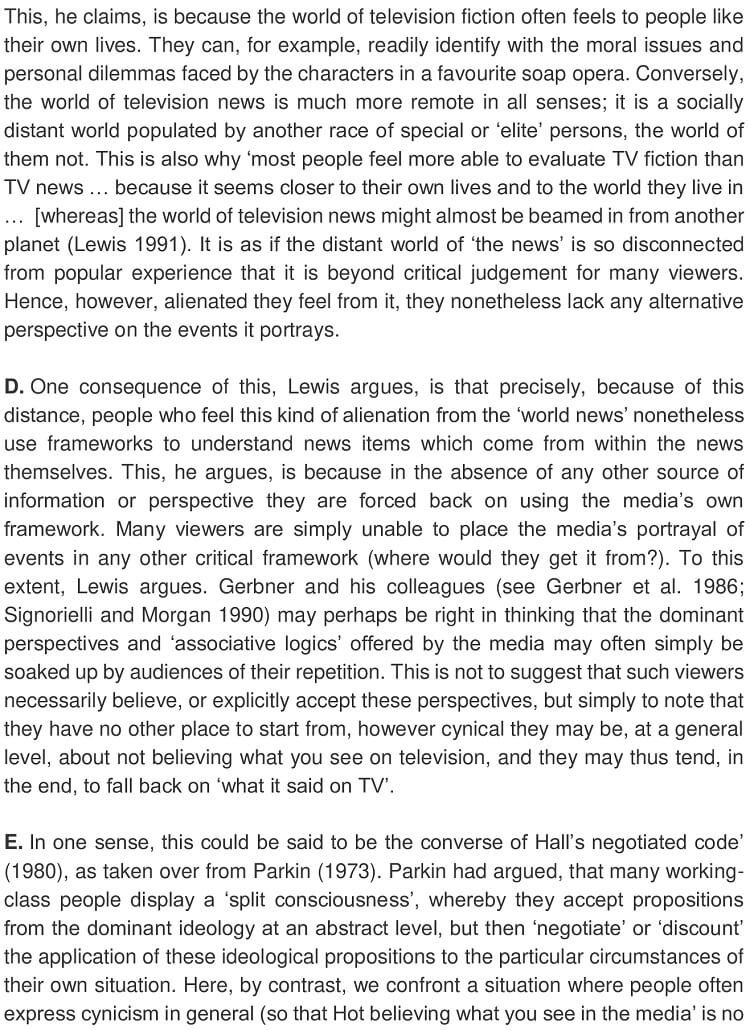

Questions 27-34
Complete the summary below using words from the box.
Write your answers in blank spaces next to 27-34 on your answer sheet.
The structure of television news.
Justin Lewis says that television news does not have the 27…………………..feature that other types of the programme have. As a result, many viewers do not find it interesting and may find it 28………………………………… This is because the 29……………………….information comes first and after that 30………………………………… matters are covered, in television news, there is no 31………………………….. progress towards a conclusion and nothing 32………………………………… to find out about. In fact, he believes that television news is an example of how the 33……………………… process in the field of television could result in something that is 34……………. to what constitutes an interesting programme.
| upsetting
contrary crucial repetitive |
creative opinionated
story-telling informative |
secondary
routine additional related |
controversial
step-by-step overwhelming contusing |
fast-moving
informal mysterious diverse |
Questions 35-40
Do the following statements agree with the information given in Reading Passage 3.;
In boxes 35—40 on your answer sheet write
TRUE, if the statement agrees with the information
FALSE, if the statement contradicts the information
NOT GIVEN, if there is no information on this
35 Lewis concentrates more on the structure of programmes than on what is actually in them.
36 Lewis regrets viewers’ preference for soap operas over television news.
37 Lewis suggests that viewers sometimes find that television news contradicts their knowledge of the world.
38 Lewis believes that viewers have an inconsistent attitude towards the reliability of television news.
39 Parkin states that many working-class people see themselves as exceptions to general beliefs.
40 The writer of the text believes that viewers should have a less passive attitude towards what they are told by the media.
Answers
Check out the answers and explanations for each question in the passages – Emigration to the US, How bugs hitch-hike across the galaxy And Finding out about the world from television news and get an idea of how you need to improve for a high IELTS Reading band score.
Unlock Answer
Signup/Login and get access to the answers
Emigration to the US Reading Answers (Passage 1)
1.
Answer: C
Question Type: Multiple Choice Questions
Answer location: Paragraph A, line 4
Answer explanation: The answer is located in paragraph A where “historians may come to discern that in the twentieth and later centuries this movement was dwarfed when Africa, Asia, and South America began to send out their peoples; but if so, they will be observing a pattern, of a whole continent in motion, that was first laid down in nineteenth-century Europe. Only the French seemed to be substantially immune to the virus.” and later centuries may be seen to be far greater than emigration from Europe to the US in the period in the past he is describing (the 19th century). Option A is incorrect because he is saying that emigration may be greater in later periods. Option B is incorrect because he does not say that he doubts the figure of 35 million. Option D is incorrect because, although he mentions that the French differed from other nationalities because they didn’t emigrate as much as the others, he doesn’t talk about what happened to different nationalities after they emigrated in the 1st paragraph.
2.
Answer: armies; navies
Question Type: Sentence Completion
Answer location: Paragraph B, line 2
Answer explanation: The answer is clearly mentioned in the said paragraph and line. You must note the paraphrasing here. In the passage, it is said that “the increasing cost of the huge armies and navies, with their need for up-to-date equipment, that every great European power maintained, implied heavier and heavier taxes which many found difficult or impossible to pay, and mass conscription, which quite as many naturally wanted to avoid.” The writer says that every great European power ‘maintained’ (kept) ‘huge armies and navies’, and that these became more expensive because of the ‘increasing cost’ that resulted from the need to have ‘up-to-date equipment’.
3.
Answer: taxes
Question Type: Sentence Completion
Answer location: Paragraph B, line 2
Answer explanation: Paragraph B put forward the information that “the increasing cost of the huge armies and navies, with their need for up-to-date equipment, that every great European power maintained, implied heavier and heavier taxes which many found difficult or impossible to pay, and mass conscription, which quite as many naturally wanted to avoid.” Big armies and navies ‘implied’ (meant, resulted in) bigger and bigger (‘heavier’) taxes to finance them and many people couldn’t pay.
4.
Answer: mass conscription
Question Type: Sentence Completion
Answer location: Paragraph B, line 2
Answer explanation: In the said paragraph, you can refer to,“the increasing cost of the huge armies and navies, with their need for up-to-date equipment, that every great European power maintained, implied heavier and heavier taxes which many found difficult or impossible to pay, and mass conscription, which quite as many naturally wanted to avoid.” Big armies and navies required lots of people to be forced by law to join them, and many people didn’t want to do that.
5.
Answer: peasants
Question Type: Sentence Completion
Answer location: Paragraph B, line 3
Answer explanation: A line in the passage mentions that “the opening up of new, superbly productive lands in the United States, Canada, Australia and New Zealand, coupled with the availability of steamers and steam trains to distribute their produce, meant that European peasants could not compete effectively in the world market: they would always be undersold, especially as the arrival of free trade was casting down the old mercantilist barriers everywhere.” Agricultural developments in other countries and improvements in the transport of agricultural goods meant that it became too expensive to pay peasants in Europe for agricultural work. Peasants could not ‘compete effectively in the world market’ (they were too expensive to employ in comparison with workers from other countries).
6.
Answer: free trade
Question Type: Sentence Completion
Answer location: Paragraph B, line 3
Answer explanation: In the said paragraph, you can point out that “the opening up of new, superbly productive lands in the United States, Canada, Australia and New Zealand, coupled with the availability of steamers and steam trains to distribute their produce, meant that European peasants could not compete effectively in the world market: they would always be undersold, especially as the arrival of free trade was casting down the old mercantilist barriers everywhere.” Restrictions on trade were removed and free trade was introduced instead. In this context ‘arrival’ means ‘Introduction’ or ‘establishment’.
7.
Answer: literacy
Question Type: Sentence Completion
Answer location: Paragraph B, line 6
Answer explanation: If you observe clearly, it is mentioned that “new printing and papermaking machines and a rapidly spreading literacy made large-circulation newspapers possible for the first time. In short, horizons widened, even for the stay-at-home.” One reason why newspapers became much more widely read was that a lot more people could read. Literacy was ‘rapidly spreading’ – there was a much greater amount of it and it was quickly becoming more widespread.
8.
Answer: New states
Question Type: Sentence Completion
Answer location: Paragraph B, 2nd last line
Answer explanation: If you read thoroughly, a line in the passage specifies that “new states came into being, old ones disappeared, frontiers were recast, the laws of land- tenure were radically altered, internal customs barriers and feudal dues both disappeared, payment in money replaced payment in kind, new industries stimulated new wants and destroyed the self-sufficiency of peasant households and the salability of peasant products.” A number of major events in Europe resulted in the formation of new states and the disappearance of old ones. In this context, ‘came into being’ means ‘had been formed’.
9.
Answer: new industries
Question Type: Sentence Completion
Answer location: Paragraph B, 2nd last line
Answer explanation: A line in the said paragraph infers that“new states came into being, old ones disappeared, frontiers were recast, the laws of land- tenure were radically altered, internal customs barriers and feudal dues both disappeared, payment in money replaced payment in kind, new industries stimulated new wants and destroyed the self-sufficiency of peasant households and the salability of peasant products.” There were many changes connected with trade and one was that new industries created (‘stimulated’) ‘new wants’ – people began to want the new goods produced by the new industries.
10.
Answer: E
Question Type: Matching sentence endings
Answer location: Paragraph C, line 4
Answer explanation: If you read thoroughly, there’s a line that claims, “matters were not much better when the Great Famine was over: it was followed by lesser ones, and the basic weaknesses of the Irish economy made the outlook hopeless anyway.” The writer says that after the Great Famine, the situation was ‘not much better’ because other famines followed and the Irish economy was weak. These problems affected the people living in Ireland.
11.
Answer: C
Question Type: Matching sentence endings
Answer location: Paragraph C, line 6
Answer explanation: In paragraph C it is mentioned that “emigration was encouraged, in me. Irish case as in many others, by letters sent home and by remittances of money.” The writer says that people who had emigrated sent letters and money back to people in Ireland, and that these things ‘encouraged’ the people receiving them to emigrate, too.
12.
Answer: G
Question Type: Matching sentence endings
Answer location: Paragraph D, line 3
Answer explanation: In the said paragraph, refer that, “the supply of Americans was too small to meet the demand: while times were good on the family farm, as they were on the whole until the 1880s, or while there was new land to be taken up in the West, the drift out of agriculture (which was becoming a permanent feature of America, as of all industrialized, society) would not be large enough to fill the factories.” the writer says that there was a ‘drift’ (movement) of American people away from agriculture at the time, but that it was not big enough to supply enough American workers for factories. Because ‘times were good on the family farm’, the ‘supply of Americans’ moving off the land and going to work in factories was ‘too small to meet the demand’, and so employers needed to employ immigrants.
13.
Answer: B
Question Type: Matching sentence endings
Answer location: Paragraph D, line 5
Answer explanation: “Then, the transcontinental railroads badly needed settlers on their Western land grants, as well as labourers: they could not make regular profits until the lands their tracks crossed were regularly producing crops that needed carrying to market.” Here, the writer says that the ‘transcontinental’ railroad companies ‘badly needed settlers’ on their land because they couldn’t make profits if people were not producing crops on the land near the railroads which would then be transported on the railroads. The ‘settlers’ were, therefore, agricultural workers.
How bugs hitch-hike across the galaxy Reading Answers (Passage 2)
14.
Answer: B
Question Type: Matching Features
Answer location: Paragraph B, line 1
Answer explanation: The opening line of paragraph B states that “on the apparently dead lunar surface, a colony of bacteria was thriving.” The ‘colony of bacteria’ found on the Moon had arrived on board the Surveyor probes.
15.
Answer: A
Question Type: Matching Features
Answer location: Paragraph A, last line
Answer explanation: The last line of paragraph A suggests that “others believe it was technological spin-offs. But according to Captain Peter Conrad, who led the 1969 Apollo 12 mission, it was life.” It was amazing that the Streptococcus bacteria had survived after their journey to the moon and because of the environment on the Moon. They arrived in the Surveyor probes, but they were discovered by the Apollo craft that Captain Conrad took to the Moon.
16.
Answer: D
Question Type: Matching Features
Answer location: Paragraph G, line 1
Answer explanation: Paragraph G puts forward the information that “Beagle’s heat shield doubled as its biological shield. So once the instruments were encased and sealed, the craft could be brought back into the real world.” Beagle’s heat shield was also its ‘biological shield’. It was intended that it became so hot that no bacteria could survive on it. Therefore, bacteria on the ‘casing’ (outer structure) were not a problem.
17.
Answer: E
Question Type: Matching Features
Answer location: Paragraph G, last line
Answer explanation: The answer is clearly mentioned in the said paragraph and line. In the passage, it is said that “its trajectory was designed so that if something went wrong, the craft would not simply crash into the planet. Its course could be corrected enroute.” Mars Express was designed so that its ‘trajectory’ (the direction of its flight) could be changed during its journey (’corrected en route’) if something went wrong.
18.
Answer: A
Question Type: Matching Features
Answer location: Paragraph H, line 3
Answer explanation: It is given that “moon rocks from Apollo were analysed in vacuum glove boxes for the first two missions.” At first, moon rocks found on Apollo missions were brought back in vacuum glove boxes, and in later missions, they were kept in nitrogen.
19.
Answer: C
Question Type: Matching Features
Answer location: Paragraph D, line 2
Answer explanation: The answer is clearly mentioned in the said paragraph and line. In the passage, it is said that “in 2003, Nasa ended the Galileo probe’s mission by smashing it into Jupiter.” The Galileo probe was destroyed because there was a fear that it might have bacteria on it that would be harmful to Europa, which was its destination. This action was carried out by ‘smashing it’ into Jupiter (causing it to crash into Jupiter and be broken into small pieces).
20.
Answer: A
Question Type: Matching Features
Answer location: Paragraph A, last line
Answer explanation: Paragraph A intimates that “others believe it was technological spin-offs. But according to Captain Peter Conrad, who led the 1969 Apollo 12 mission, it was life.” The writer says that some people believe that Apollo’s most important discovery was rocked, but others think its most important discovery related to ‘technological spin-offs’ – advances in technology that resulted from what was discovered.
21.
Answer: clean room
Question Type: Diagram Completion
Answer location: Paragraph E, line 1
Answer explanation: If you read thoroughly, there’s a line in the said paragraph that describes “Beagle had to be assembled in a ‘clean room’ – and one was specially put together in a converted BBC outside broadcast van garage in Milton Keynes.” This was built in a building that used to be a garage where vehicles used by the BBC (British Broadcasting Corporation) for broadcasting from outside studios were stored.
22.
Answer: glass wall
Question Type: Diagram Completion
Answer location: Paragraph F, line 1
Answer explanation: You can note the paraphrasing here. In the passage, it states that “they were given information through a glass wall, over mikes and monitors. And sometimes on a piece of paper stuck to the glass with sticky tape.” The people assembling Beagle were given information from outside the part where it was being assembled through the wall by use of microphones (mikes) and monitors (screens), or pieces of paper stuck onto the wall, and the people giving the information did not go in and out of the part where it was being assembled.
23.
Answer: electronic equipment
Question Type: Diagram Completion
Answer location: Paragraph F, line 2
Answer explanation: If you read thoroughly, there’s a line in the said paragraph “the easy stuff was heated to 115C for 52 hours, more than enough to kill off Dugs. Electronic equipment can’t cope with those sorts of temperatures, so the team used a hydrogen peroxide plasma, created in a microwave, to kill off bugs at low temperatures.” Bacteria on electronic equipment were killed at low temperatures by something created in a microwave because the high temperatures used on other things would have damaged the electronic equipment (it ‘can’t cope with those sorts of temperatures).
24.
Answer: gamma radiation
Question Type: Diagram Completion
Answer location: Paragraph F, line 3
Answer explanation: In the reference paragraph, the author mentions that “parachutes and gas bags were zapped with gamma radiation. It wasn’t just facial hair that was banned.” Bacteria on parachutes and gas bags were destroyed by gamma radiation. They were ‘zapped with’ (treated with great force, hit hard by) gamma radiation.
25.
Answer: beards/facial hair
Question Type: Diagram Completion
Answer location: Paragraph E, last line
Answer explanation: Paragraph E puts forward the information that “there was a ban on beards and a limit of four people at any one time. The team kept samples of everything that could have contaminated the craft and monitored every stage of assembly.” Beards and facial hair, in general, were not allowed (there was ‘a ban on’ beards and facial hair was ‘banned’), presumably because they could carry bacteria. This applied to the people going into the part where Beagle was being assembled.
26.
Answer: fans
Question Type: Diagram Completion
Answer location: Paragraph E, line 2
Answer explanation: The answer is clearly mentioned in the said paragraph and line. In the passage, it is said that “it had enough room to include an enormous set of fans that circulated and filtered the air 500 times an hour.” In the part where Beagle was assembled, ‘an enormous set of’ (a very large number of, a lot of) fans ‘circulated and filtered’ the air (distributed it around the room and kept it pure).
Finding out about the world from television news Reading Answers (Passage 3)
27.
Answer: story-telling
Question Type: Summary Completion
Answer location: Paragraph A, line 1
Answer explanation: The opening line of paragraph A puts forward the information that “the Ideological Octopus (1991). Justin Lewis points to an important issue concerning the formal structure of television news.” This has the same meaning as ‘narrative’ in the text.
28.
Answer: confusing
Question Type: Summary Completion
Answer location: Paragraph A, line 4
Answer explanation: The author in the said line suggests that “people often cannot understand it. Lewis argues that one fundamental problem with watching television news is that its narrative structure means that the viewer is offered the punchline before the joke – because the main point (the headline) comes right at the beginning, after which the programme, by definition, deals with less and less important things.” People ‘cannot understand’ television news, which means they find it confusing.
29.
Answer: crucial
Question Type: Summary Completion
Answer location: Paragraph A, line 5
Answer explanation: If you read thoroughly, the author in the given paragraph mentions that “Lewis argues that one fundamental problem with watching television news is that its narrative structure means that the viewer is offered the punchline before the joke – because the main point (the headline) comes right at the beginning, after which the programme, by definition, deals with less and less important things.” The text states that ‘the main point (the headline) comes right at the beginning’. This means that the most important (crucial) information comes first.
30.
Answer: secondary
Question Type: Summary Completion
Answer location: Paragraph A, line 4
Answer explanation: In the said paragraph, refer that, “people often cannot understand it. Lewis argues that one fundamental problem with watching television news is that its narrative structure means that the viewer is offered the punchline before the joke – because the main point (the headline) comes right at the beginning, after which the programme, by definition, deals with less and less important things.” The text states that ‘less and less important things’ come next. ‘Secondary’ means ‘of less importance’.
31.
Answer: step-by-step
Question Type: Summary Completion
Answer location: Paragraph A, line 6
Answer explanation: The text refers. “thus, in television news our interest is not awakened by an enigma which is then gradually solved, to provide a gratifying solution – as so often happens in fictional narratives.” The fiction having something that is gradually solved’. This means that it is solved in stages, not all at once; ‘step-by-step progress’ is progress involving various stages towards a final result.
32.
Answer: mysterious
Question Type: Summary Completion
Answer location: Paragraph A, 2nd last line
Answer explanation: Paragraph A puts forward the information that “in Lewis’s terms, in television news, there is no enigma, the solution of which will motivate the viewing process.” The text says that ‘there is no enigma’ in television news. An enigma is something that people do not understand or find strange but is fascinated by or very interested in; ‘mysterious’ means strange and interesting.
33.
Answer: creative
Question Type: Summary Completion
Answer location: Paragraph A, last line
Answer explanation: In the said paragraph, refer that, “as he baldly states, ‘If we decided to try to design a television programme with a structure that would completely fail to capture an audience’s interest, we might (finally) come up with the format of the average television news show’ (Lewis 1991).” The text refers to people trying to ‘design’ a television programme, which means having the ideas for and creating one. The ‘creative’ process, therefore, refers to designing a programme.
34.
Answer: contrary
Question Type: Summary Completion
Answer location: Paragraph B, line 1
Answer explanation: The opening line of paragraph B puts forward the information that “what Lewis also does is offer an interesting contrast, in this respect, between the high-status phenomenon of television news and the low-status genre of soap opera.” The text is saying that if people tried to create a programme that had all the features a programme should not have, they would design the television news; in other words, television news has all the features a programme should not have. It Is therefore completely different from what an interesting programme is like. ‘Contrary to’ means ‘completely different from’ or ‘opposite to’.
35.
Answer: TRUE
Question Type: True/False/Not Given Questions
Answer location: Paragraph B, line 5
Answer explanation: If you clearly observe, it is given that “there are counter examples of his arguments (e.g. instances of programmes such as sports news which share the problematic formal features he points to but which are nonetheless popular – at least among certain types of viewers).” The writer of the text says that there are problems with Lewis’s theories; there are ‘counter-examples of his arguments’ (examples which suggest that his theories are not correct), and he concentrates too much on the ‘formal features’ of programmes rather than on the important matter of their content.
36.
Answer: NOT GIVEN
Question Type: True/False/Not Given Questions
Answer location: Paragraph C, line 3
Answer explanation: The author in paragraph C puts forward the information that “they can, for example, readily identify with the moral issues and personal dilemmas faced by the characters in a favourite soap opera.” Lewis says that people prefer soap operas to television news because their own lives have more in common with what happens in soap operas than with what they see on television news. They can ‘identify with’ people in soap operas, but television news presents them with a world that is ‘remote’ and ‘distant1 and they feel ‘disconnected’ from what happens in it. However, we are not told that he thinks it is a pity that this is the case; we are not told whether or not he gives a view on whether this is a good or bad thing.
37.
Answer: FALSE
Question Type: True/False/Not Given Questions
Answer location: Paragraph C, line 4
Answer explanation: Author mentions that “this is also why ‘most people feel more able to evaluate TV fiction than TV news … because it seems closer to their own lives and to the world they live in … [whereas] the world of television news might almost be beamed in from another planet (Lewis 1991).” According to Lewis, the television news could come ‘from another planet’ as far as many viewers are concerned. It shows them a ‘distant world’ that is ‘disconnected from’ their own experience of life. They feel ‘alienated’ from it but have no ‘alternative perspective’ to use to evaluate what they see. This means that they have no personal knowledge or experience that is useful to them when watching the news. The problem is not that the news differs completely from (contradicts) what they have experienced, it is that It has no relationship with what they know or have experienced.
38.
Answer: TRUE
Question Type: True/False/Not Given Questions
Answer location: Paragraph D, last line
Answer explanation: The last line of paragraph D states that “this is not to suggest that such viewers necessarily believe, or explicitly accept these perspectives, but simply to note that they have no other place to start from, however cynical they may be, at a general level, about not believing what you see on television, and they may thus tend, in the end, to fall back on ‘what it said on TV’.” Lewis says that people talk about ‘not believing what you see on television’ and have a generally ‘cynical’ attitude to it, but that they also ‘fall back on what it said on TV’ (use or rely on because they have nothing else to use or rely on). In other words, they have an inconsistent attitude (one that changes at different times) – they say they don’t believe what they see on television news, but in fact, they do believe it because they have no knowledge or experience that would enable them to know it is wrong.
39.
Answer: TRUE
Question Type: True/False/Not Given Questions
Answer location: Paragraph E, line 2
Answer explanation: If you read thoroughly, the author in the given paragraph mentions that “Parkin had argued, that many working-class people display a ‘split consciousness’, whereby they accept propositions from the dominant ideology at an abstract level, but then ‘negotiate’ or ‘discount’ the application of these ideological propositions to the particular circumstances of their own situation.” ‘Parkin Parkin says that working-class people ‘accept propositions from the dominant ideology at an abstract level’ (in theory, they accept the beliefs that are most commonly held in their culture), but in practice, they find ways in which these beliefs do not have to apply to them in their own lives (in the ‘particular circumstances of their own situation’). They, therefore, regard themselves as exceptions to these general rules.
40.
Answer: NOT GIVEN
Question Type: True/False/Not Given Questions
Answer location: Paragraph
Answer explanation: In the last sentence, the writer says “here, by contrast, we confront a situation where people often express cynicism in general (so that Hot believing what you see in the media’ is no more than common sense), but then in any particular case, they often find themselves pushed back into reliance on the mainstream media’s account of anything beyond the realm of their direct personal experience, simply for lack of any alternative perspective.” Hence, people tend to disbelieve the media in general, but on every individual matter that arises, they are ‘pushed back into reliance on’ (forced to rely on) what the media are saying because they have no way of proving that is untrue. He is, therefore, saying that they are forced to be passive consumers of the media, but he does not say that they are wrong in this or that there is anything they can do about it.
Also check:
- 101 IELTS Academic Reading test papers with answers pdf
- Time Management for IELTS Reading
- IELTS Reading – Keyword Techniques – How to Use
- IELTS Exam Preparation tips | How to prepare for IELTS?
- IELTS Reading recent actual test
Practice IELTS Reading based on question types

Start Preparing for IELTS: Get Your 10-Day Study Plan Today!
Explore other Reading Practice Tests
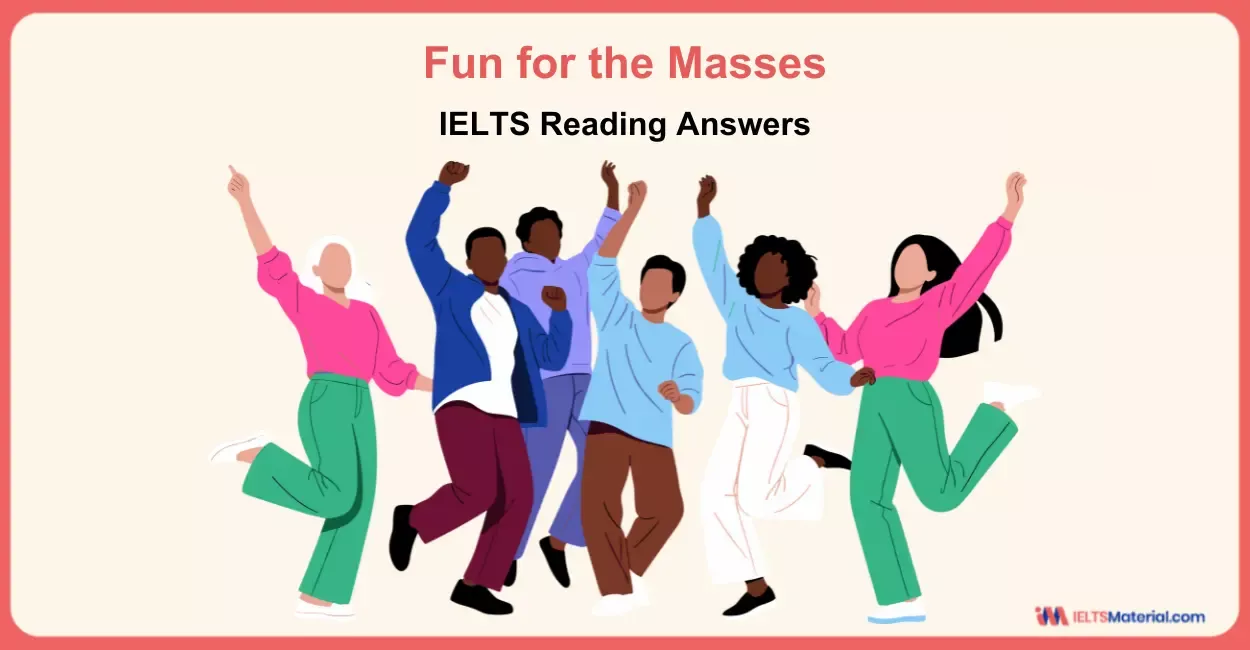
Nehasri Ravishenbagam

Nehasri Ravishenbagam

Kasturika Samanta
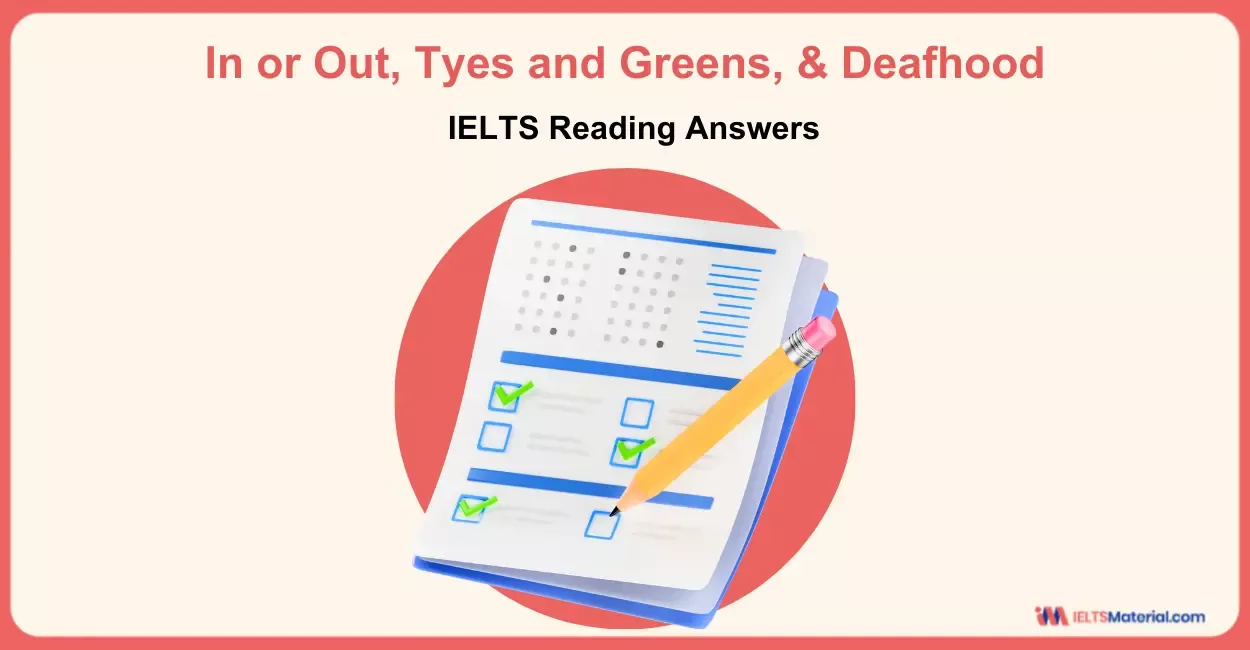
Nehasri Ravishenbagam
Recent Articles

Nehasri Ravishenbagam

Haniya Yashfeen

Haniya Yashfeen

Haniya Yashfeen



Post your Comments